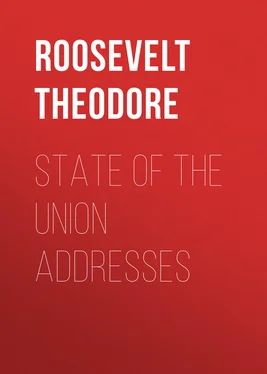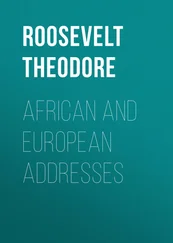Theodore Roosevelt - State of the Union Addresses
Здесь есть возможность читать онлайн «Theodore Roosevelt - State of the Union Addresses» — ознакомительный отрывок электронной книги совершенно бесплатно, а после прочтения отрывка купить полную версию. В некоторых случаях можно слушать аудио, скачать через торрент в формате fb2 и присутствует краткое содержание. Жанр: foreign_edu, Технические науки, Политика, на английском языке. Описание произведения, (предисловие) а так же отзывы посетителей доступны на портале библиотеки ЛибКат.
- Название:State of the Union Addresses
- Автор:
- Жанр:
- Год:неизвестен
- ISBN:нет данных
- Рейтинг книги:5 / 5. Голосов: 1
-
Избранное:Добавить в избранное
- Отзывы:
-
Ваша оценка:
- 100
- 1
- 2
- 3
- 4
- 5
State of the Union Addresses: краткое содержание, описание и аннотация
Предлагаем к чтению аннотацию, описание, краткое содержание или предисловие (зависит от того, что написал сам автор книги «State of the Union Addresses»). Если вы не нашли необходимую информацию о книге — напишите в комментариях, мы постараемся отыскать её.
State of the Union Addresses — читать онлайн ознакомительный отрывок
Ниже представлен текст книги, разбитый по страницам. Система сохранения места последней прочитанной страницы, позволяет с удобством читать онлайн бесплатно книгу «State of the Union Addresses», без необходимости каждый раз заново искать на чём Вы остановились. Поставьте закладку, и сможете в любой момент перейти на страницу, на которой закончили чтение.
Интервал:
Закладка:
Steps have been taken by the State Department looking to the making of bribery an extraditable offense with foreign powers. The need of more effective treaties covering this crime is manifest. The exposures and prosecutions of official corruption in St. Louis, Mo., and other cities and States have resulted in a number of givers and takers of bribes becoming fugitives in foreign lands. Bribery has not been included in extradition treaties heretofore, as the necessity for it has not arisen. While there may have been as much official corruption in former years, there has been more developed and brought to light in the immediate past than in the preceding century of our country's history. It should be the policy of the United States to leave no place on earth where a corrupt man fleeing from this country can rest in peace. There is no reason why bribery should not be included in all treaties as extraditable. The recent amended treaty with Mexico, whereby this crime was put in the list of extraditable offenses, has established a salutary precedent in this regard. Under this treaty the State Department has asked, and Mexico has granted, the extradition of one of the St. Louis bribe givers.
There can be no crime more serious than bribery. Other offenses violate one law while corruption strikes at the foundation of all law. Under our form of Government all authority is vested in the people and by them delegated to those who represent them in official capacity. There can be no offense heavier than that of him in whom such a sacred trust has been reposed, who sells it for his own gain and enrichment; and no less heavy is the offense of the bribe giver. He is worse than the thief, for the thief robs the individual, while the corrupt official plunders an entire city or State. He is as wicked as the murderer, for the murderer may only take one life against the law, while the corrupt official and the man who corrupts the official alike aim at the assassination of the commonwealth itself. Government of the people, by the people, for the people will perish from the face of the earth if bribery is tolerated. The givers and takers of bribes stand on an evil pre-eminence of infamy. The exposure and punishment of public corruption is an honor to a nation, not a disgrace. The shame lies in toleration, not in correction. No city or State, still less the Nation, can be injured by the enforcement of law. As long as public plunderers when detected can find a haven of refuge in any foreign land and avoid punishment, just so long encouragement is given them to continue their practices. If we fail to do all that in us lies to stamp out corruption we can not escape our share of responsibility for the guilt. The first requisite of successful self-government is unflinching enforcement of the law and the cutting out of corruption.
For several years past the rapid development of Alaska and the establishment of growing American interests in regions theretofore unsurveyed and imperfectly known brought into prominence the urgent necessity of a practical demarcation of the boundaries between the jurisdictions of the United States and Great Britain. Although the treaty of 1825 between Great Britain and Russia, the provisions of which were copied in the treaty of 1867, whereby Russia conveyed Alaska to the United States, was positive as to the control, first by Russia and later by the United States, of a strip of territory along the continental mainland from the western shore of Portland Canal to Mount St. Elias, following and surrounding the indentations of the coast and including the islands to the westward, its description of the landward margin of the strip was indefinite, resting on the supposed existence of a continuous ridge or range of mountains skirting the coast, as figured in the charts of the early navigators. It had at no time been possible for either party in interest to lay down, under the authority of the treaty, a line so obviously exact according to its provisions as to command the assent of the other. For nearly three-fourths of a century the absence of tangible local interests demanding the exercise of positive jurisdiction on either side of the border left the question dormant. In 1878 questions of revenue administration on the Stikine River led to the establishment of a provisional demarcation, crossing the channel between two high peaks on either side about twenty-four miles above the river mouth. In 1899 similar questions growing out of the extraordinary development of mining interests in the region about the head of Lynn Canal brought about a temporary modus vivendi, by which a convenient separation was made at the watershed divides of the White and Chilkoot passes and to the north of Klukwan, on the Klehini River. These partial and tentative adjustments could not, in the very nature of things, be satisfactory or lasting. A permanent disposition of the matter became imperative.
After unavailing attempts to reach an understanding through a Joint High Commission, followed by prolonged negotiations, conducted in an amicable spirit, a convention between the United States and Great Britain was signed, January 24, 1903, providing for an examination of the subject by a mixed tribunal of six members, three on a side, with a view to its final disposition. Ratifications were exchanged on March 3 last, whereupon the two Governments appointed their respective members. Those on behalf of the United States were Elihu Root, Secretary of War, Henry Cabot Lodge, a Senator of the United States, and George Turner, an ex-Senator of the United States, while Great Britain named the Right Honourable Lord Alverstone, Lord Chief Justice of England, Sir Louis Amable Jette, K. C. M. G., retired judge of the Supreme Court of Quebec, and A. B. Aylesworth, K. C., of Toronto. This Tribunal met in London on September 3, under the Presidency of Lord Alverstone. The proceedings were expeditious, and marked by a friendly and conscientious spirit. The respective cases, counter cases, and arguments presented the issues clearly and fully. On the 20th of October a majority of the Tribunal reached and signed an agreement on all the questions submitted by the terms of the Convention. By this award the right of the United States to the control of a continuous strip or border of the mainland shore, skirting all the tide-water inlets and sinuosities of the coast, is confirmed; the entrance to Portland Canal (concerning which legitimate doubt appeared) is defined as passing by Tongass Inlet and to the northwestward of Wales and Pearse islands; a line is drawn from the head of Portland Canal to the fifty-sixth degree of north latitude; and the interior border line of the strip is fixed by lines connecting certain mountain summits lying between Portland Canal and Mount St. Elias, and running along the crest of the divide separating the coast slope from the inland watershed at the only part of the frontier where the drainage ridge approaches the coast within the distance of ten marine leagues stipulated by the treaty as the extreme width of the strip around the heads of Lynn Canal and its branches.
While the line so traced follows the provisional demarcation of 1878 at the crossing of the Stikine River, and that of 1899 at the summits of the White and Chilkoot passes, it runs much farther inland from the Klehini than the temporary line of the later modus vivendi, and leaves the entire mining district of the Porcupine River and Glacier Creek within the jurisdiction of the United States.
The result is satisfactory in every way. It is of great material advantage to our people in the Far Northwest. It has removed from the field of discussion and possible danger a question liable to become more acutely accentuated with each passing year. Finally, it has furnished a signal proof of the fairness and good will with which two friendly nations can approach and determine issues involving national sovereignty and by their nature incapable of submission to a third power for adjudication.
Читать дальшеИнтервал:
Закладка:
Похожие книги на «State of the Union Addresses»
Представляем Вашему вниманию похожие книги на «State of the Union Addresses» списком для выбора. Мы отобрали схожую по названию и смыслу литературу в надежде предоставить читателям больше вариантов отыскать новые, интересные, ещё непрочитанные произведения.
Обсуждение, отзывы о книге «State of the Union Addresses» и просто собственные мнения читателей. Оставьте ваши комментарии, напишите, что Вы думаете о произведении, его смысле или главных героях. Укажите что конкретно понравилось, а что нет, и почему Вы так считаете.












